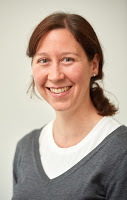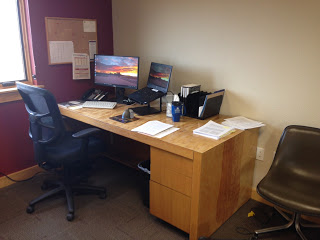I am Maryse Bourgault, and This is How I Work
 Today, I have the pleasure of interviewing Dr. Maryse Bourgault. Maryse is an Assistant Professor at Montana State University Northern Agricultural Research Center in Cropping Systems and Agronomy. Her aim is to help improve the productivity, profitability and sustainability of agricultural systems in Montana and other dry areas through diversification of cropping systems, in particular using pulse crops (field peas, lentils, chickpeas) in rotation in cereal-based cropping systems. She is a crop physiologist by training and uses these methodologies to bridge the gap between field- and farm-level productivity and genetic improvement for drought and cold tolerance. She previously conducted research on the effects of elevated CO2 in Australia at the Australian Grains Free Air CO2 Enrichment (AGFACE) and at CSIRO with the Climate Adaptation Flagship program. Maryse graduated with a Ph.D. from McGill University (Montreal, Canada) in 2009.
Today, I have the pleasure of interviewing Dr. Maryse Bourgault. Maryse is an Assistant Professor at Montana State University Northern Agricultural Research Center in Cropping Systems and Agronomy. Her aim is to help improve the productivity, profitability and sustainability of agricultural systems in Montana and other dry areas through diversification of cropping systems, in particular using pulse crops (field peas, lentils, chickpeas) in rotation in cereal-based cropping systems. She is a crop physiologist by training and uses these methodologies to bridge the gap between field- and farm-level productivity and genetic improvement for drought and cold tolerance. She previously conducted research on the effects of elevated CO2 in Australia at the Australian Grains Free Air CO2 Enrichment (AGFACE) and at CSIRO with the Climate Adaptation Flagship program. Maryse graduated with a Ph.D. from McGill University (Montreal, Canada) in 2009.
Current job: Assistant Professor, Cropping Systems Agronomy
Current Location: Havre, MT
Current mobile device: iPhone (but I don’t know if the next one will be)
Current computer: DELL
Please explain your current situation and research to us.
I have just started as an Assistant Professor at Montana State University Northern Agricultural Research Station. My research direction is yet to be defined, but I am particularly interested in using crop physiology to support breeding by variety/advanced lines characterization. I am also interested in testing new crops for increased diversification for benefits in soil health, reduced disease pressure, etc.
What tools, apps, or software are essential to your work flow?
For better or for worst, the Microsoft Office suite. We use the outlook calendar as a group quite a bit, and it allows us to see what everyone is up to.
For statistics and data visualization and making graphs, I use R.
I also like the software FreeMind, a mind map software, although sometimes, my white board is just as good.
What does your workspace look like?
I used to like to alternate between offices (home, lab, library even), but I am increasingly appreciative of a fixed workplace. It allows me to compartmentalize work and leisure activities/rest. I find it helps me with my work-life balance. This said, I do not get interrupted much at work, so it does not break my flow when trying to write (or I put a sign on my door saying “Trying to write; enter at your own risk” – which knowing me people know it is a joke (I won’t bite their heads off), but they also know not to bother me for too long). I would like to have my desk clean and uncluttered, but I tend to have unread papers in various piles (something I’m working on…).

What is your best advice for productive academic work?
What has helped me a lot is to have a regular schedule. I know not everyone is like this, and of course during the field season, this does not apply, but at least when I am in the office, I do an 8 to 5 day. And I focus on work and only work during this time. If I know I’ll work on the weekend, then I start doing other things (paying bills, checking things out on the net, etc.) and I don’t feel guilty, because, hey, I’ll be pulling more hours this week. However, I find that I get more distracted, and I might do more hours, but I am not convinced I achieve more in the end.
How do you keep track of projects and tasks?
Every month, I take some time to reflect on my achievements of the last month, I plan the following month, I think about what might go wrong, and I identify priorities. And I write it all down. I have a special lab book for this. I have been doing this for the last nine years, since mid-way through my PhD, and it has worked great for me. I still underestimate how long it might take for tasks, but I’m getting better at it. I will sometimes have another look at it if something crops up that I didn’t expect. At other times, especially if I feel overwhelmed by everything that needs to be done, I use it just to remind myself of what really needs to be done, and what can wait a bit more.
Besides phone and computer, do you use other technological tools in work and daily life?
I do have a tablet, mostly for reading, but honestly, I still use a lot of paper and ink. My “agenda” (besides what I need to share with others which ends up on our shared calendar) consists of blank monthly calendar sheets I print off Outlook and I fill these by hand (usually in pencil, so I can erase). My lab books are all paper and ink – often I’ll print graphs off and paste them in. The paper calendar helps me count days better (for example when growing plants), and I find the paper lab books are better when trying to find something. It might take a bit longer, but I think it also allows me more time to think.
Which skills make you stand out as an academic?
I have checked with colleagues about this, and the first thing that I was told was that I was personable and friendly and that I could talk with just anyone. It’s important when dealing with farmers to be approachable, and I think it has helped me a lot to get this new job.
What do you listen to when you work?
I used to listen to Sarah McLachlan, Enya, Miss Higgins, Nora Jones… easy listening, soothing music or classical such as Chopin and Mozart when reading or writing. In the field, anything goes! In the last few years though, I found that when reading or writing, I prefer to work without music at all as I find it distracting.
What are you currently reading? How do you find time for reading?
I do read a lot both at work and at home. I have lived without a television at home for years, listening to the news on the radio and catching some programs on the internet only. So, I read a lot of fiction for entertainment, crime thrillers, sci-fi fantasy, romance, drama, etc. At work, I will sometimes book specific time slots for reading, especially as part of a literature review for a project proposal and when I start a manuscript. I also take time during lunch to read the Societies magazines and trade magazines.
Are you more of an introvert or extrovert? How does this influence your working habits?
This is a little hard to say because every test I have done is putting me either a little of one or the other, so I think I am mostly in the middle. I do tend to feel a little lonely if I am working from home for too long, but I also get a bit overwhelmed with everyone in conferences. For every day routine though, it is good. I’m happy to be around people without talking to them much during the day, but I’m also happy to have a good long (productive) chat with someone once in a while as well.
What is your sleep routine like?
I sleep a lot! I love sleeping! LOL. I like to get to bed at 10 pm and get up around 6 or 6:30 am, although I often get to bed a little later (and end up throwing myself out of bed at 7:30…). I often sleep until noon on Saturdays. It also happens on Sunday, but I try to get up earlier so I’m not turning in bed for hours on Sunday night trying to get to sleep.
What is your work routine like?
I like to follow the routine of everyone else around me. It sort of forces me to get to work in the morning – and to get home not too late at night. These days, I’m working 8 to 5 pm. During field work, we can pull long days and then it is a different story. This said, I’m not a workaholic. I really like to focus on work during office hours, and do other stuff during evenings and weekends.
What is the best advice you ever received?
It’s important to know what you want in life. Things will not always go your way, and no one ever only does what they want, but at least when the going gets tough, you don’t have to go adrift as well. There might be situations where the choice is to stay or leave, and if you know what you want, you can make that choice and not feel victimized.
